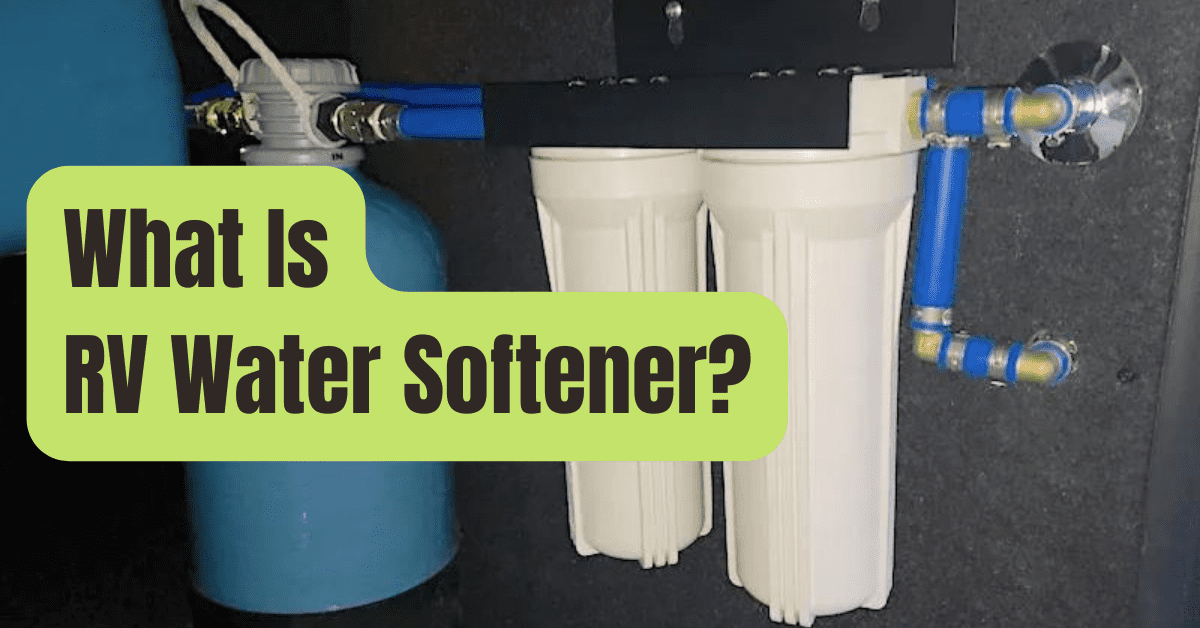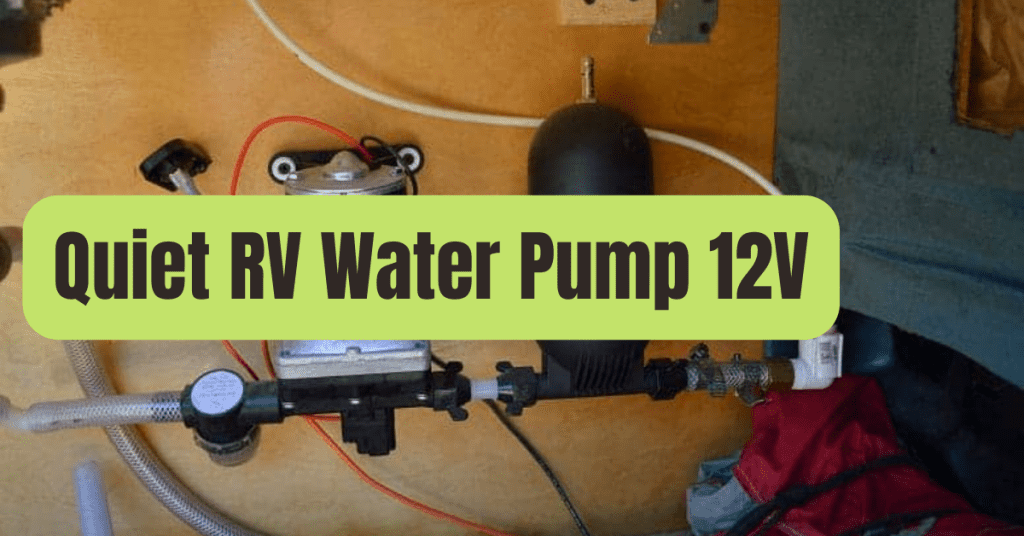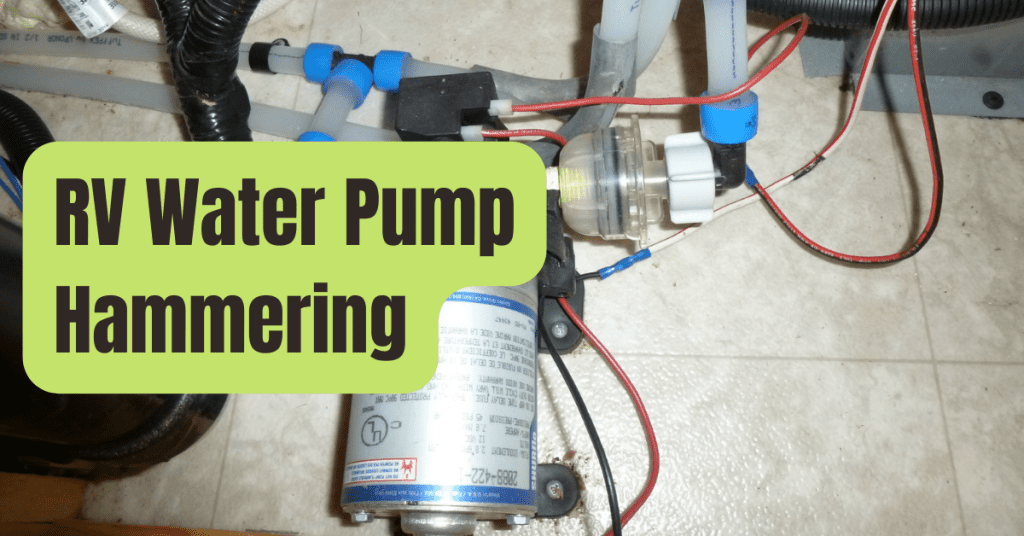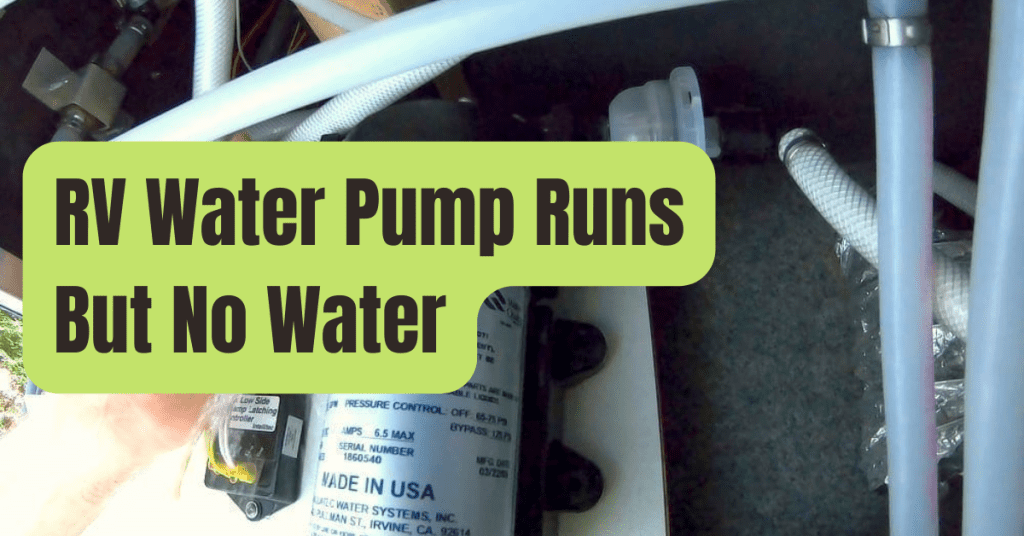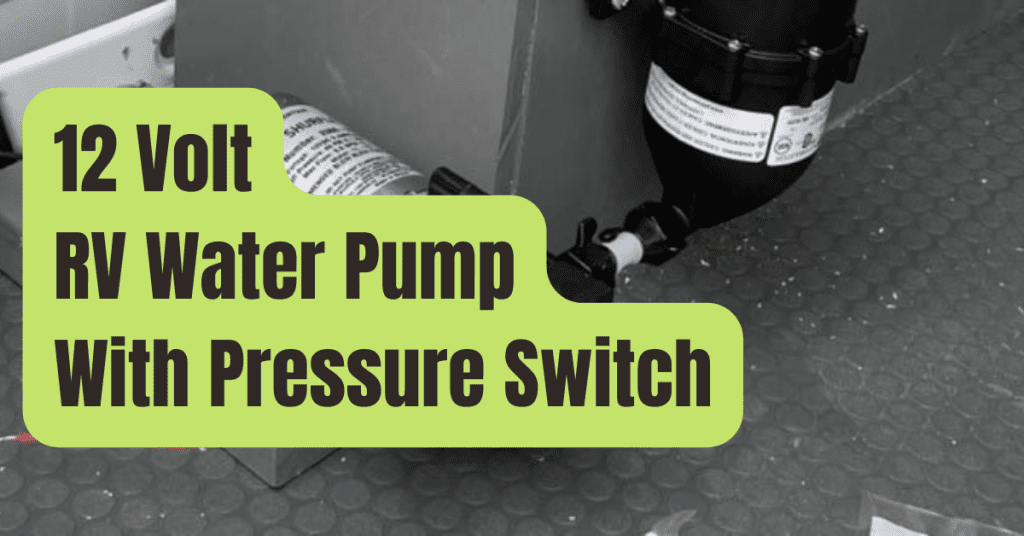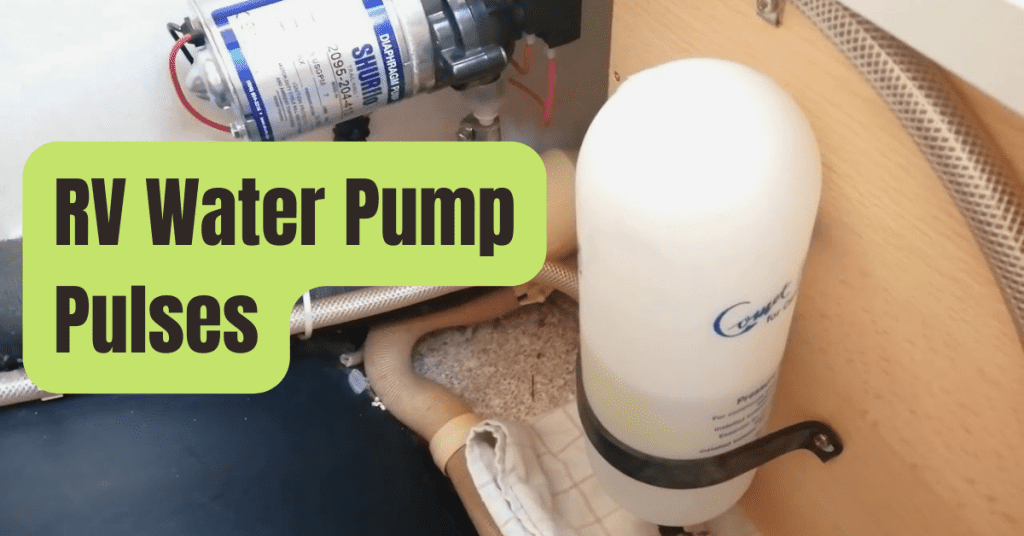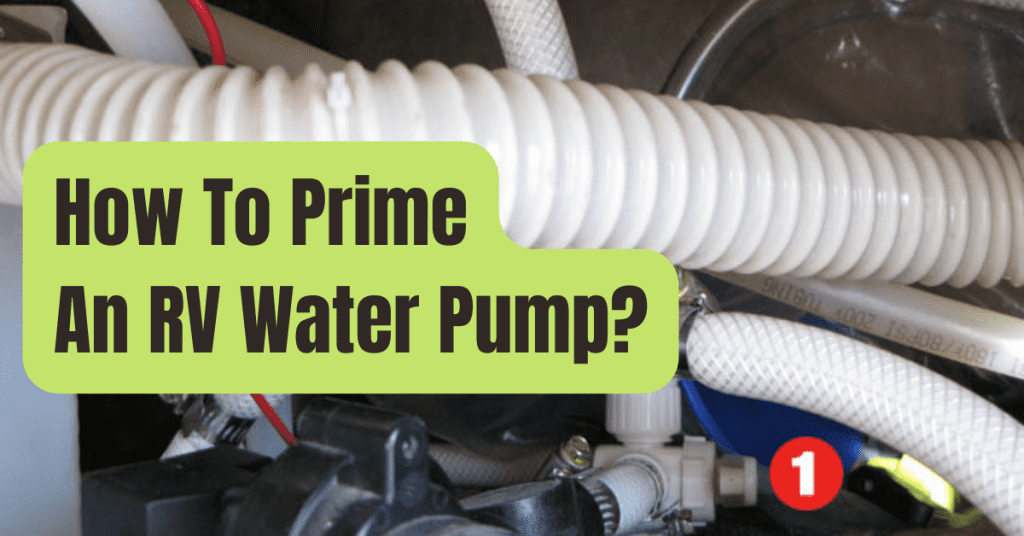Surely water is just water? It seems that’s not always the case, however.
Certain water is referred to be “hard” because it contains minerals like lime and iron that may be rough on your skin, your RV’s plumbing system, and even break some equipment.
Being prepared with an RV water softener may be extremely beneficial when you never know what your water supply will be, whether at campsites or from water fill stations.
Therefore, today’s topic is RV water softeners, including what they are, how they function, and how they could help certain RVers.
What Is A Water Softener For An RV?
Ion exchange is a method used by RV water softeners to soften hard water.
Through ion exchange, sodium ions are used to replace hard water components like lime, iron, calcium, and magnesium.

In certain areas, limestone may leach significant concentrations of magnesium and calcium into the groundwater, rendering the water “hard” and giving it a foul taste.
Hard-water chemicals have the potential to build up in your RV’s plumbing system, potentially causing damage and shortening the lifetime of its parts.
They may build up in your water heater, plumbing, and fixtures.
It’s possible that the rust stains on your sinks and toilet, as well as the showerhead on your RV, are signs of concentrated minerals.
An RV water softener could be useful if this is the case, particularly if you often travel through regions with hard water (like the Desert Southwest).
How Does a Water Softener in an RV Operate?
An RV water softener operates similarly to an inline water filter, such as the one we demonstrate in this piece.
Between the water supply and the water intake of your RV, the water softener is connected outdoors.
The undesirable minerals in the entering water are drawn to the housing by a kind of glue.
Ion exchange takes place in the resin as the water passes through the softener, exchanging the “hard” minerals (calcium, magnesium, and perhaps iron) for sodium chloride.
The resultant output water is now “soft,” and it enters the plumbing system of your RV.
The system may be restarted using a procedure known as “regeneration” when the resin is re-saturated with the salt ions and cleansed of the other minerals it gathered during usage.
This is done after the salt ions in the water softener have been used up in the ion exchange process.
Advantages of RV Water Softeners
Your skin, your RV’s plumbing, and its water-consuming appliances will all benefit most from employing an RV water softener.
For instance, if the calcification of collected minerals from hard water damages your RV water heater, you may be looking at a costly repair or maybe a water heater replacement.
The same is true for other RV equipment, including coffee makers and washers.
The buildup may also affect the flow of water and harm pipes and faucets.

If your fresh water tank is full with hard water, it might even harm your RV water pump.
Hard water can harm any equipment that uses water, including coffee makers, laundry washers, and dishwashers.
Hard water also impairs the appropriate foaming of soap and other cleaning agents.
As a result, you could notice that your dish soap doesn’t appear to froth up as much, your soap or shower gel doesn’t suds up as much, or your clothing comes out looking dirty (and feeling rough from the minerals left behind).
Hard water also dries out skin and hair, which is a problem that everyone is aware of.
A water softener may also make your water taste better, prevent mineral buildup in showerheads and faucets, and prevent rust stains in sinks and toilet bowls.
How Durable Are RV Water Softeners?
The lifespan of portable water softeners is typically between five and fifteen years, although it considerably relies on the amount of water used and the hardness of the water being treated, both of which affect how often the regeneration process takes place.
Resin replacement is possible with certain RV water softeners.
Accordingly, if the resin has to be changed after 5-7 years, fresh resin may be introduced to the system, extending its lifespan by an additional 5-7 years.
RV water softeners may (and should) undergo a five-minute back-flushing procedure every few months to help clear the system of accumulated “hard” minerals and maintain it functioning properly.
The life of the water softener will be shortened if this is not done.
Most water softeners are packaged with instructions for the back-flushing procedure.
Is Drinking Softened Water Okay?
There are a few things you should be aware of even though millions of people drink softened water every day and it’s safe to do so.

People who follow a low-sodium diet should avoid drinking water that has been softened on a regular basis, as should pregnant or nursing women.
Softened water is somewhat demineralized and has a little bit more sodium than unsoftened water.
Depending on how “hard” the incoming water supply is, the quantity of sodium in the softened water will change.
Therefore, it is advised to speak with your doctor if you are on a low-sodium diet for medical reasons, or if you are pregnant or breastfeeding.
What an RV Water Softener Should Have
The hardness of the water you will be softening should be your first priority.
If RV owners travel from location to location, it might be challenging.
For measuring water hardness, a kit like this one is helpful (this kit includes 50 test strips, and results are shown in approximately 30 seconds):
Sale
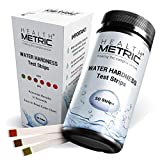
Health Metric Pro Water Hardness Test Kit | Quick & Easy Hard Water Test Strips for Water Softener Dishwasher Well Spa and Pool Water | 50 Tester Strips at 0-425 ppm | Calcium & Magnesium Hardness
- EASY TO READ COLOR CHART – The big color chart, which ranges from red to green, makes differentiating your test findings simple. Overall toughness is…
- QUICK AND ACCURATE – Save time and get the test results in a matter of seconds. No need to wait for someone else to check the or go to a hardware shop.
Normally, you would determine the capacity at which your water softener would need to operate before going water softener shopping.
This is how it would go:
Grains per gallon are used to measure the “hardness” of water (gpg).
The number of grains of water hardness that a water softener can remove before needing to regenerate is known as its rated capacity.
You should take into account how many individuals will be utilizing the water on a daily basis.
Each person consumes, on average, 80 gallons a day in a home, which, YIKES, sounds like a LOT! For example, when we’re in “extreme boondocking” mode and attempting to prolong our fresh water supply, we normally use approximately 6 gallons of water per day, or about 3 gallons/person per day.
In an RV, you should (ideally!) calculate substantially lower consumption than that.
Therefore, you would multiply the total number of frequent water users by the estimated daily consumption per person, and then multiply that result by the amount of hardness granules in your water.
This would establish the quantity of grains that need removal each day.
After that, you would buy a water softener for an RV that could manage that load.
The technical method of determining the capacity you would want to purchase is as follows.
Most stick and brick homes for four people employ a 33,000-grain unit (for an 80-gallon per person average).
A unit with around half that capacity is probably needed for an RV.
A four-person RV home would thus search for a unit of around 16,000 grains, and a two-person RV household for roughly half of that.
Leaving the legalities aside, you could wish to think about which models RVers most often purchase and give them the highest ratings.
The biggest small RV water softener available is this 16,000-grain model.
It provides 40% more softened water than any other device on the market and regenerates in approximately 30 minutes using two boxes of table salt.
It employs a typical garden hose connection to link your RV to the water supply at the campsite, making it a very well-liked and rated water softener.
Additionally, it is portable and doesn’t need energy or equipment.
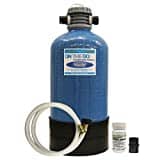
On The Go OTG4-DBLSOFT-Portable 16,000 Grain RV Water Softener
- The most compact RV softener available, the Double Normal Softener & Conditioner generates twice as many gallons as the standard unit.
- This 16,000 grain unit is designed for the owner of any RV/Marine type and fits well. It provides around 40% more soft water than any other unit on the market.
For a smaller RV with fewer water-related appliances or RVers living in the home, this 8,000-grain unit might be adequate:

On The Go OTG3NTP3M Portable Water Softener
- Removes scale, rust, paint, and dirt
- Size of the package: 7.0
Both of these units are affordable in terms of cost and footprint, and neither one needs frequent regeneration.
They each consume a box or two of regular table salt in the process (size and weight).
Taking into account each of these factors is crucial while looking for an RV water softener.
Which Water Softening Alternative Is Best?
If calcification does develop, you may opt to deal with it by descaling your appliances as an alternative to an RV water softener.
For instance, white vinegar may be used to descale your RV water heater.
A chemical like CLR may also be used to clean the scale off of shower heads and faucet aerators as well as in dishwashers and washing machines for RVs.
(Unfortunately, you can’t use the same technique to descale the pipes in your RV.)
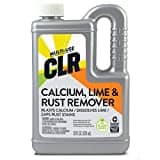
CLR Calcium, Lime & Rust Remover, Blasts Calcium, Dissolves Lime, Zaps Rust Stains, 28 Ounce Bottle (Packaging May Vary)
- Industrial Strength: CLR Calcium, Lime and Rust Remover is a non-toxic, all-purpose cleaner suited for surfaces in bathrooms and kitchens. It…
- Fast Acting: Effectively gets rid of soap scum, discolouration, calcium, lime, and hard water deposits. Cleans and polishes surfaces, stainless steel,
Or, you may use white vinegar as a descaler on your plumbing fixtures and appliances if you’d prefer use something milder (and/or more accessible).
Are RV Water Softeners Necessary?
The answer to this question mostly relies on the water sources you use to fill up your RV’s plumbing system and if you have “hard” water issues.
Consider installing an RV water softener if you often stay put or spend a lot of time in a region with especially hard water, such as the Southwest Desert, some regions of Florida, Wyoming, Montana, or Nevada.
You may not need a water softener at all if you’ve been traveling for a while and your style of RVing hasn’t caused you any problems, such as mineral buildup in your shower head or sink faucets or signs of rust in your sinks or toilets.
If you have had any or all of these problems, it could be a good idea to pick up a test kit to see how hard the water is where you often travel.
It’s comforting to know that an RV water softener could hold the answer if you’ve been struggling with problems similar to these.

